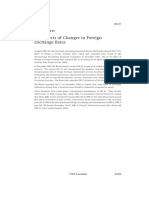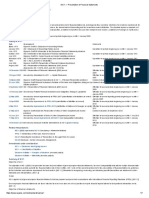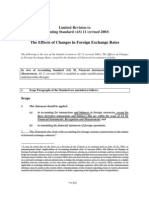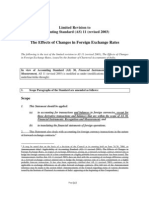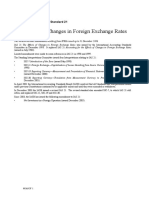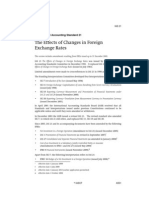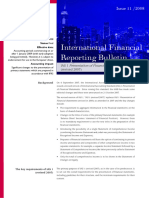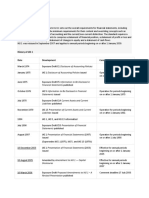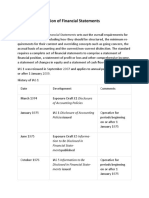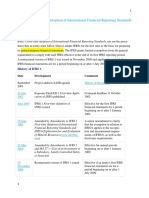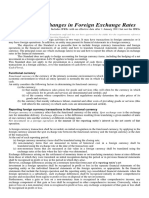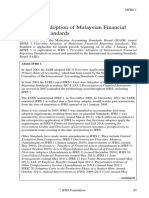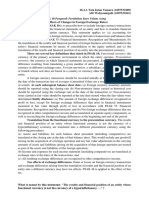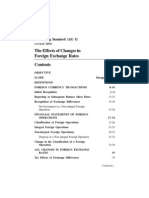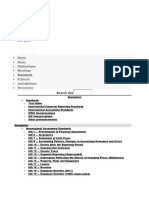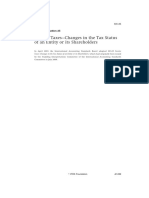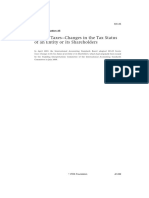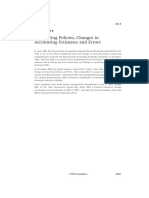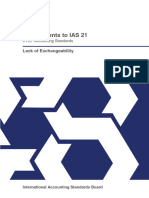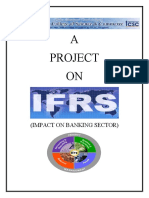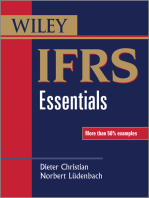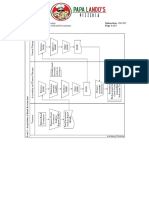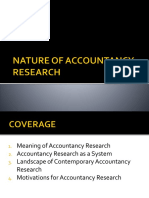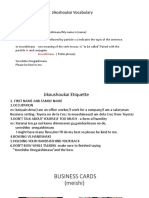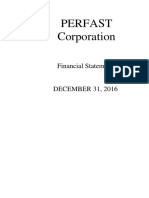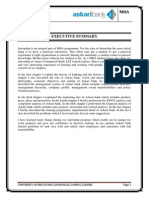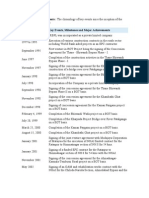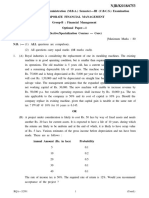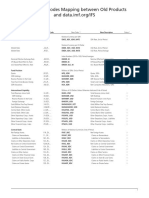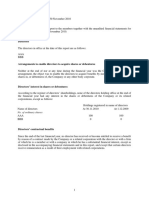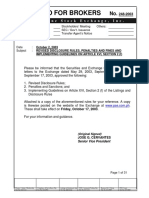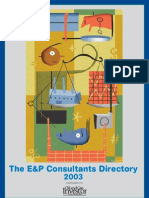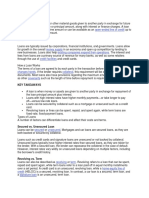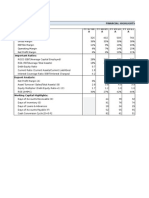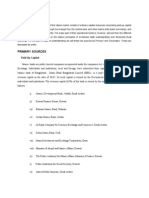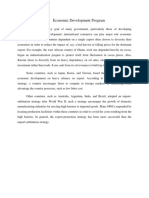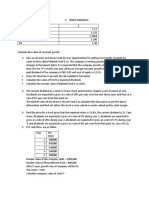Introduction of The Euro: SIC Interpretation 7
Introduction of The Euro: SIC Interpretation 7
Uploaded by
Rolando G. Cua Jr.Copyright:
Available Formats
Introduction of The Euro: SIC Interpretation 7
Introduction of The Euro: SIC Interpretation 7
Uploaded by
Rolando G. Cua Jr.Original Description:
Original Title
Copyright
Available Formats
Share this document
Did you find this document useful?
Is this content inappropriate?
Copyright:
Available Formats
Introduction of The Euro: SIC Interpretation 7
Introduction of The Euro: SIC Interpretation 7
Uploaded by
Rolando G. Cua Jr.Copyright:
Available Formats
SIC-7
SIC Interpretation 7
Introduction of the Euro
In April 2001 the International Accounting Standards Board adopted SIC-7 Introduction of the
Euro, which had originally been issued by the Standing Interpretations Committee of the
International Accounting Standards Committee in May 1998.
Other IFRSs have made minor consequential amendments to SIC-7. These include IAS 21 The
Effects of Changes in Foreign Exchange Rates (as revised in December 2003) and IAS 1 Presentation
of Financial Statements (as revised in September 2007).
姝 IFRS Foundation A1315
SIC-7
SIC Interpretation 7 Introduction of the Euro (SIC-7) is set out in paragraphs 3 and 4. SIC-7 is
accompanied by a Basis for Conclusions. The scope and authority of Interpretations are
set out in paragraphs 2 and 7–16 of the Preface to International Financial Reporting Standards.
FOR THE BASIS FOR CONCLUSIONS ON SIC-7 SEE PART B OF THIS EDITION
A1316 姝 IFRS Foundation
SIC-7
SIC Interpretation 7
Introduction of the Euro
References
● IAS 1 Presentation of Financial Statements (as revised in 2007)
● IAS 8 Accounting Policies, Changes in Accounting Estimates and Errors
● IAS 10 Events after the Reporting Period
● IAS 21 The Effects of Changes in Foreign Exchange Rates (as revised in 2003)
● IAS 27 Consolidated and Separate Financial Statements (as amended in 2008)
Issue
1 From 1 January 1999, the effective start of Economic and Monetary Union (EMU),
the euro will become a currency in its own right and the conversion rates
between the euro and the participating national currencies will be irrevocably
fixed, ie the risk of subsequent exchange differences related to these currencies
is eliminated from this date on.
2 The issue is the application of IAS 21 to the changeover from the national
currencies of participating Member States of the European Union to the euro
(‘the changeover’).
Consensus
3 The requirements of IAS 21 regarding the translation of foreign currency
transactions and financial statements of foreign operations should be strictly
applied to the changeover. The same rationale applies to the fixing of exchange
rates when countries join EMU at later stages.
4 This means that, in particular:
(a) foreign currency monetary assets and liabilities resulting from
transactions shall continue to be translated into the functional currency
at the closing rate. Any resultant exchange differences shall be
recognised as income or expense immediately, except that an entity shall
continue to apply its existing accounting policy for exchange gains and
losses related to hedges of the currency risk of a forecast transaction;
(b) cumulative exchange differences relating to the translation of financial
statements of foreign operations, recognised in other comprehensive
income, shall be accumulated in equity and shall be reclassified from
equity to profit or loss only on the disposal or partial disposal of the net
investment in the foreign operation; and
(c) exchange differences resulting from the translation of liabilities
denominated in participating currencies shall not be included in the
carrying amount of related assets.
姝 IFRS Foundation A1317
SIC-7
Date of consensus
October 1997
Effective date
This Interpretation becomes effective on 1 June 1998. Changes in accounting policies shall
be accounted for according to the requirements of IAS 8.
IAS 1 (as revised in 2007) amended the terminology used throughout IFRSs. In addition it
amended paragraph 4. An entity shall apply those amendments for annual periods
beginning on or after 1 January 2009. If an entity applies IAS 1 (revised 2007) for an earlier
period, the amendments shall be applied for that earlier period.
IAS 27 (as amended in 2008) amended paragraph 4(b). An entity shall apply that
amendment for annual periods beginning on or after 1 July 2009. If an entity applies IAS 27
(amended 2008) for an earlier period, the amendment shall be applied for that earlier
period.
A1318 姝 IFRS Foundation
You might also like
- Accounting For Foreign Currency TransactionsDocument3 pagesAccounting For Foreign Currency TransactionsMaureen Derial PantaNo ratings yet
- Cleaning Service Marketing PlanDocument20 pagesCleaning Service Marketing PlanPalo Alto Software96% (26)
- Sic 7Document4 pagesSic 7Evelina Del RosarioNo ratings yet
- Introduction of The Euro: SIC Interpretation 7Document4 pagesIntroduction of The Euro: SIC Interpretation 7Cryptic LollNo ratings yet
- SIC 07 - Introduction of The EuroDocument4 pagesSIC 07 - Introduction of The EuroJimmyChaoNo ratings yet
- GCA Consultants: Introduction of The EuroDocument34 pagesGCA Consultants: Introduction of The EuroNaeem MalikNo ratings yet
- MFRS 121 042015 PDFDocument26 pagesMFRS 121 042015 PDFChessking Siew HeeNo ratings yet
- IAS 21 - The Effects of Changes in Foreign Exchange RatesDocument40 pagesIAS 21 - The Effects of Changes in Foreign Exchange RatesNitroNo ratings yet
- BV2018 - MFRS 121Document21 pagesBV2018 - MFRS 121chukanchukanchukanNo ratings yet
- IAS 21 - Effects of Changes in Foreign Exchange PDFDocument22 pagesIAS 21 - Effects of Changes in Foreign Exchange PDFJanelle SentinaNo ratings yet
- The Effects of Changes in Foreign Exchange Rates: IAS Standard 21Document22 pagesThe Effects of Changes in Foreign Exchange Rates: IAS Standard 21JorreyGarciaOplasNo ratings yet
- IAS 1 - Presentation of Financial StatementsDocument7 pagesIAS 1 - Presentation of Financial StatementsNico Rivera CallangNo ratings yet
- The Effects of Changes in Foreign Exchange Rates: Limited Revision To Accounting Standard (AS) 11 (Revised 2003)Document4 pagesThe Effects of Changes in Foreign Exchange Rates: Limited Revision To Accounting Standard (AS) 11 (Revised 2003)sks0865No ratings yet
- 298 Announ 1222 LRAS11Document4 pages298 Announ 1222 LRAS11teamhackerNo ratings yet
- The Effects of Changes in Foreign Exchange Rates: International Accounting Standard 21Document23 pagesThe Effects of Changes in Foreign Exchange Rates: International Accounting Standard 21Md Rasel Uddin ACMANo ratings yet
- Annotated BB2023 A IAS01 PartA PDFDocument62 pagesAnnotated BB2023 A IAS01 PartA PDFKhutso MabalaNo ratings yet
- History of IFRS 7: Reclassification of Financial Assets (Amendments To IAS 39 and IFRS 7) IssuedDocument5 pagesHistory of IFRS 7: Reclassification of Financial Assets (Amendments To IAS 39 and IFRS 7) IssuedTin BatacNo ratings yet
- The Effects of Changes in Foreign Exchange Rates: International Accounting Standard 21Document22 pagesThe Effects of Changes in Foreign Exchange Rates: International Accounting Standard 21RachelBaricuatroNo ratings yet
- Ias1 - Example of Income Statement Presentation-1Document10 pagesIas1 - Example of Income Statement Presentation-1Denisa KollcinakuNo ratings yet
- PAS1Document18 pagesPAS1Lyanna MormontNo ratings yet
- Consolidated and Separate Financial Statements: International Accounting Standard 27Document41 pagesConsolidated and Separate Financial Statements: International Accounting Standard 27davidwijaya1986No ratings yet
- IasDocument229 pagesIasPeter Apollo Latosa100% (1)
- IFRS 1 - First-Time Adoption of International Financial Reporting StandardsDocument49 pagesIFRS 1 - First-Time Adoption of International Financial Reporting StandardsTeofel John Alvizo PantaleonNo ratings yet
- BV2021CR - MFRS1 First-Time Adoption of Malaysian Financial Reporting StandardsDocument43 pagesBV2021CR - MFRS1 First-Time Adoption of Malaysian Financial Reporting StandardsChee Juan PhangNo ratings yet
- IFRS 1-First-Time Adoption of International Financial Reporting StandardsDocument12 pagesIFRS 1-First-Time Adoption of International Financial Reporting StandardsShahid MahmudNo ratings yet
- Ias 21 (2011)Document2 pagesIas 21 (2011)jjjjjjjjjjjjjjjNo ratings yet
- The Effects of Changes in Foreign Exchange Rates: Technical SummaryDocument2 pagesThe Effects of Changes in Foreign Exchange Rates: Technical SummaryjjjjjjjjjjjjjjjNo ratings yet
- IAS 1 - Presentation of Financial StatementsDocument162 pagesIAS 1 - Presentation of Financial StatementsNitroNo ratings yet
- BV2018 - MFRS 1Document41 pagesBV2018 - MFRS 1imieNo ratings yet
- PSAK 10 Pengaruh Perubahan Kurs Valuta AsingDocument1 pagePSAK 10 Pengaruh Perubahan Kurs Valuta AsingWahyuniiNo ratings yet
- Ias 1 Presentation of Financial StatementsDocument13 pagesIas 1 Presentation of Financial StatementsShahbaz MalikNo ratings yet
- The Effects of Changes in Foreign Exchange RatesDocument17 pagesThe Effects of Changes in Foreign Exchange RatesMIKASANo ratings yet
- IFRS 2018 - Red - Book - IFRS - 1 - First-Time - Adoption - of - International - Financial - Reporting - StandardsDocument136 pagesIFRS 2018 - Red - Book - IFRS - 1 - First-Time - Adoption - of - International - Financial - Reporting - StandardsPeter ParkerNo ratings yet
- International Financial Reporting StandardsDocument5 pagesInternational Financial Reporting StandardsRohan BhagatNo ratings yet
- AS 11 ForexDocument19 pagesAS 11 ForexArun SarathyNo ratings yet
- Ias-Interim Financial ReportingDocument8 pagesIas-Interim Financial Reportingnguyenvy845No ratings yet
- IFRS Model Financial Statements 2020 - Appendix 2Document12 pagesIFRS Model Financial Statements 2020 - Appendix 2Pawan GautamNo ratings yet
- AuditingDocument3 pagesAuditingMd. Abir HasanNo ratings yet
- IAS 21 - The Effects of Changes in Foreign Exchange RatesDocument1 pageIAS 21 - The Effects of Changes in Foreign Exchange RatesSt Dalfour CebuNo ratings yet
- MFRS 1Document42 pagesMFRS 1hyraldNo ratings yet
- Sfrs (I) Int 1-25 (2023)Document5 pagesSfrs (I) Int 1-25 (2023)willNo ratings yet
- Interim Financial Reporting: International Accounting Standard 34Document16 pagesInterim Financial Reporting: International Accounting Standard 34Cryptic LollNo ratings yet
- IAS21Document3 pagesIAS21Mohammad Faisal SaleemNo ratings yet
- IAS 1 Presentation of FSDocument17 pagesIAS 1 Presentation of FSLeen LurNo ratings yet
- CombinepdfDocument20 pagesCombinepdfKen ZafraNo ratings yet
- CombinepdfDocument14 pagesCombinepdfKen ZafraNo ratings yet
- MFRS 108Document22 pagesMFRS 108Yeo Chioujin0% (1)
- IFRS Illustrative Financial Statements (Dec 2023)Document286 pagesIFRS Illustrative Financial Statements (Dec 2023)Vamsi Krishna GaragaNo ratings yet
- International Accounting StandardsDocument24 pagesInternational Accounting StandardsWaqas WaraichNo ratings yet
- Accounting Policies, Changes in Accounting Estimates and ErrorsDocument20 pagesAccounting Policies, Changes in Accounting Estimates and ErrorsJorreyGarciaOplasNo ratings yet
- International Accounting StandardsDocument16 pagesInternational Accounting StandardsjanzzzzNo ratings yet
- Changes in This EditionDocument6 pagesChanges in This Editionbriantang0534No ratings yet
- Iasb 2023 Loe Ias 21Document30 pagesIasb 2023 Loe Ias 21marielamasottoNo ratings yet
- A Project ON: (Impact On Banking Sector)Document21 pagesA Project ON: (Impact On Banking Sector)Akshay BhandeNo ratings yet
- Separate Financial Statements: International Accounting Standard 27Document10 pagesSeparate Financial Statements: International Accounting Standard 27babylovelylovelyNo ratings yet
- Treaty Establishing the European Stability Mechanism (ESM)From EverandTreaty Establishing the European Stability Mechanism (ESM)No ratings yet
- 100-305 Acquisition of Bond InvestmentDocument3 pages100-305 Acquisition of Bond InvestmentRolando G. Cua Jr.No ratings yet
- Advanced Accounting Part 2 Dayag 2015 Chapter 16Document1 pageAdvanced Accounting Part 2 Dayag 2015 Chapter 16Rolando G. Cua Jr.No ratings yet
- Nature of Accountancy Research 1Document29 pagesNature of Accountancy Research 1Rolando G. Cua Jr.No ratings yet
- Japanese Phrase Tanoshii-OmoshiroiDocument9 pagesJapanese Phrase Tanoshii-OmoshiroiRolando G. Cua Jr.No ratings yet
- Jikoshoukai VocabularyDocument5 pagesJikoshoukai VocabularyRolando G. Cua Jr.100% (1)
- Jiko Shou KaiDocument16 pagesJiko Shou KaiRolando G. Cua Jr.100% (1)
- ACC132 - Home Office and Branch Accounting PDFDocument50 pagesACC132 - Home Office and Branch Accounting PDFRolando G. Cua Jr.92% (12)
- Ashok Resume NewDocument3 pagesAshok Resume NewVishvajeet DasNo ratings yet
- Time Value of MoneyDocument15 pagesTime Value of MoneytamtradeNo ratings yet
- Statement of Financial PositionDocument29 pagesStatement of Financial PositionPaulette SarnoNo ratings yet
- Board of Directors: Mr. Nirmal JainDocument4 pagesBoard of Directors: Mr. Nirmal JainMadhu DeshpandeNo ratings yet
- Perfast Corporation - NotesDocument9 pagesPerfast Corporation - NotesMCDABCNo ratings yet
- Balanced Scorecard SCMDocument5 pagesBalanced Scorecard SCMudelkingkongNo ratings yet
- Ali PDF AskariDocument175 pagesAli PDF AskariUsman AfzalNo ratings yet
- History and Major Events: The Chronology of Key Events Since The Inception of TheDocument4 pagesHistory and Major Events: The Chronology of Key Events Since The Inception of TheSahil GulatiNo ratings yet
- Electric Item-BBA-MBA Project ReportDocument79 pagesElectric Item-BBA-MBA Project ReportpRiNcE DuDhAtRaNo ratings yet
- Trading ManualDocument24 pagesTrading Manualehsan453100% (1)
- Mba 3 Sem Corporate Financial Management Group B Financial Management Paper 1 Summer 2018Document3 pagesMba 3 Sem Corporate Financial Management Group B Financial Management Paper 1 Summer 2018pranali nagleNo ratings yet
- IFS Annex IDocument12 pagesIFS Annex IMahedrz GavaliNo ratings yet
- Mall ManagementDocument13 pagesMall ManagementCharu Modi100% (1)
- The Overview of Gold Etfs and Its Various Positive Features: April 2013Document12 pagesThe Overview of Gold Etfs and Its Various Positive Features: April 2013tannuNo ratings yet
- Sample FS PDFDocument20 pagesSample FS PDFCjls KthyNo ratings yet
- NTUF Sri LankaDocument8 pagesNTUF Sri LankaChajanan ANo ratings yet
- PSE Disclosure RulesDocument31 pagesPSE Disclosure RulesLeolaida AragonNo ratings yet
- Slides - Alternative Investments - Infrastructure and Other Alternative InvestmentsDocument14 pagesSlides - Alternative Investments - Infrastructure and Other Alternative Investmentsjargon100% (1)
- Final ProjectDocument81 pagesFinal ProjectHimanshu ShokeenNo ratings yet
- 7 Steps To Making A Killing Trading FX EbookDocument10 pages7 Steps To Making A Killing Trading FX Ebookkrishnan112No ratings yet
- Consultants DirectoryDocument36 pagesConsultants DirectoryPeter WahlburgNo ratings yet
- What Is A Loan?: Open-Ended Line of CreditDocument13 pagesWhat Is A Loan?: Open-Ended Line of CreditJohn Matthew JoboNo ratings yet
- The Gold Stock SecretDocument19 pagesThe Gold Stock SecrethahahaNo ratings yet
- Dummy Financial ModelDocument17 pagesDummy Financial ModelarhawnnNo ratings yet
- GE 9 CELL MODEL - Businnss PoicyDocument3 pagesGE 9 CELL MODEL - Businnss Poicytanuias2009No ratings yet
- Sources of FundsDocument8 pagesSources of FundsMurshedAlamChowdhuryNo ratings yet
- Economic Development ProgramDocument3 pagesEconomic Development ProgrammikaillianaNo ratings yet
- Stock ValuationDocument2 pagesStock Valuationxaud qureshiNo ratings yet
- Tata Balanced Advantage Fund - NFO PresentationDocument23 pagesTata Balanced Advantage Fund - NFO Presentationabhishek sharmaNo ratings yet










